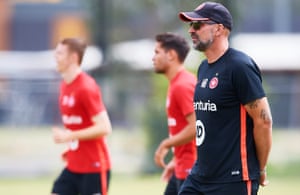[ad_1]
The Germans have a delightful way with words. Take zweifel; in English it means “doubt”, but this nowhere near captures the deep, almost existential, uncertainty contained in the German. James Joyce and Samuel Beckett once tried to render it in English and came up with “in twisome two-mind” – adding a sense of oscillation, of panic, of confusion.
It’s a feeling nobody has needed to unpack for Western Sydney Wanderers chairman Paul Lederer or CEO John Tsatsimas this week, as they contemplate their own problematic German with a colourful turn of language.
After five straight losses the questions surrounding Markus Babbel exploded last week, amid claims of white-anting by assistant Jean-Paul de Marigny, and complaints by players within the Wanderers environment. Facing a “must-win” on Friday night, Babbel’s Wanderers soldiered through a tense but uninspiring 1-1 draw against Western United. With 11 minutes to go, the German appeared reprieved. Eight minutes later, all was once again uncertain. It’s a zone the 47-year-old has inhabited for the vast majority of his 19 months in Australia.
Arriving on a high of goodwill, backed by his illustrious playing career and his pockets of success coaching in the Bundesliga and Bundesliga 2, Babbel was afforded plenty of time to rebuild following the calamitous tenure of predecessor Josep Gombau. A round two Sydney derby VAR-bacle saw the German red carded, but endeared him to his supporters for his passion and forthrightness. A Keisuke Honda-inspired Melbourne Victory dismantled the Wanderers in December, before a run of six straight losses in January saw the supporters start to drift and the campaign chalked-off as a rebuild.
With a full pre-season, a fresh cohort of Babbel-endorsed players arriving, and a return to their Parramatta Stadium fortress, 2019/20 was billed as “no excuses” for the Wanderers. And yet here they are. The erstwhile Champions of Asia started 2019 with six straight defeats. They very nearly finished it with six more. Therein lies the headache-inducing doubt, oscillation and uncertainty – in a word, zweifel – for the Wanderers’ leadership.

Babbel’s defenders will point to the reaction from his players upon scoring on Friday: this was not the collective outpouring of a dressing room eager to see its coach gone. The losses that the Wanderers have accumulated this year have been tight, contained passages of positive play, and none have emitted the absolute stench of an Oriel Riera-led insurrection that Gombau suffered this time two years ago.
And yet plaguing the thoughts of the Wanderers’ bosses will be two huge factors: the style of football under Babbel, and its own meandering inconsistency.
A coach like Ange Postecoglou is unequivocal about his style. It’s not for everyone, but if the players buy in the proof is in the NSL, A-League, Asian Cup and J-League titles his attacking philosophy delivered. Others have preferred a system built on defensively stability. In the A-League there will always be errors, there will always be opportunities. Tony Popovic won a premiership last season with such an approach, Wanderers fans may even recall him doing so in 2012/13 in their inaugural season.
But for the Wanderers under Babbel, there’s no clear, consistent, definable playing style. Reactive instead of proactive, the German has shown himself at times cautious, at times expansive. At times looking to dominate possession, at times happy to sit off. Team formations have changed. Team personnel have changed. Players in form have been dropped, players out of form have been persisted with. Youngsters have come in, done well, then disappeared.
Advocates for the German will point to key injuries, but European counterparts Gertjan Verbeek and Erick Mombaerts have faced their share of those too. A youngster like Mo Adam or Kosta Grozos can be forgiven for a despairing look elsewhere – as an Al Hassan Toure or Louis D’Arrigo, a Denis Genreau or Connor Metcalfe continue to thrive and flourish under hugely experienced European coaches.
Babbel’s strong-worded rejection of a perceived old-school mentality around training, barking midweek that complaining youngsters would “have no fucking chance in Europe” would do little to assuage a club leadership that prides itself on its academy investment, and flies against his self-proclaimed philosophy during his time at Stuttgart: offensive football with young, hungry, home-grown talent.
The one marked consistency has been the losses. With 20 defeats in just 37 games – 16 of these coming in 2019 alone – Babbel has simply failed to stem the leak of goals. With a backline boasting four A-League championship winners and a goalkeeper that’s arguably the league’s best, for Lederer & co it’s either no excuses or more excuses.
The hesitancy to fire the underperforming German may come from a desire to return to the stability of the Popovic era, but also the fact that ten rounds in the Wanderers sit just one point outside the top six.
To fire a likeable, charismatic coach? Or to risk fan enervation by allowing underperformance to linger? It’s a decision with tremendous financial and reputational repercussions either way. No wonder the Wanderers’ bosses are in twisome-two minds.
[ad_2]
Source link
